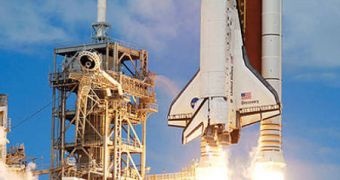Members of the Review of US Human Space Flight Plans Committee said recently that the United States could fulfill the objective of taking astronauts back to the Moon by 2020, but also mentioned that this couldn't be done with current funding. In addition, the same panel also reviewed NASA's decision to stop using the space shuttle after 2010, and concluded that this course of action could not be supported. It argued that the shuttles had to keep on flying until the space station was completed, as the US had obligations to its partners, with which it had built the $100-billion laboratory.
“The manifest as currently stated through 2010 is exceptionally ambitious and requires a flight rate that is approximately twice what the post Columbia flight rate has been,” the Chair of the National Academies Space Studies Board, Charles Kennel, who is also a review panel member, says. At this point, the space agency has seven more shuttle flights planned until the end of 2010, not counting the current STS-127 assembly mission by the shuttle Endeavor, Space reports.
The panel also argued that the life span of the ISS should also be extended beyond its planned 2015 decommissioning date, at least until 2020. Its feelings are in tune with other voices that say it would be a pity for the lab to be destroyed only five years after it is fully assembled. “We think all of the options going forward should include an extension of ISS in some form,” panel member Sally Ride, who is a former astronaut, shares.
At a hearing scheduled for next month in Washington, the panel will also provide its conclusion to the president on issues related to returning to the Moon. Members currently review several launch options, including the ARES I and V planned delivery systems, and the United Launch Alliance Delta IV Heavy or Atlas V rockets. They argued that cost overruns were endemic to Project Constellation, and that other alternatives needed to be studied as well. NASA stated that, after four years in the making, replacing Constellation would be catastrophic and would push back travel to the Moon by at least a decade.
“The ARES I and V development is the fastest and most prudent path to closing the human spaceflight gap while enabling exploration of the moon and beyond,” Steve Cook, the NASA Ares program manager, told the panel. “Given our assessment of the 2010 budget and what we believe about cost and schedule, we just simply said there is not enough money in this budget in the near term to do the human lunar return,” The Aerospace Corp Vice President Gary Pullium added. NASA's funds for 2010 have been reduced by $26.5 billion from earlier estimates.

 14 DAY TRIAL //
14 DAY TRIAL //